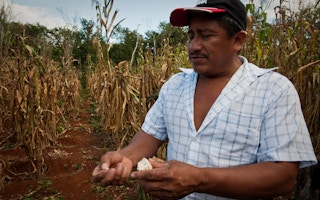Earlier this month a new July heat record was set in Africa. The Algerian city of Ouargla hit 124 degrees Fahrenheit (51 degrees Celsius).
It’s a reminder—if we need it—that the world’s hottest continent is getting hotter as a result of climate change, and the 1.2 billion people who live there need help to cope.
Imagine what that heat does to farms and crops. What it does to children attending schools without air conditioning, or patients in hospitals. Imagine its effect on a country’s economy.
And it’s just the start. As the UN’s climate science panel is likely to warn later this year in an upcoming new report, weather extremes linked to climate change are intensifying.
The Green Climate Fund (GCF) was founded in 2010 with this in mind. In a fragmented landscape of over a hundred funds, the GCF was seen as both increasing and coordinating funding flows.
It is viewed by many developing countries as critical to their future in a warming world. A fund that they have a stake in, a voice on the board, an ability to set a strategic direction.
And let me be clear: the potential of the GCF and multi-billion funding commitments from the developed world opened the door to the 2015 Paris Agreement on climate change.
We would not have received the hundreds of national climate plans ahead of Paris from poorer nations had they not had assurances they would receive help in delivering them.
Ghana’s plans for off-grid electricity networks, DRC’s ambitions to cut illegal logging, Ethiopia’s dreams for a low emission transport system all require substantial funding.
So it was with no little disappointment that I read of the heat emanating from the GCF’s latest board meeting in South Korea, and which ended with its executive director quitting.
The GCF is more than just a fund. It is part of a global commitment made in 2010. A line in the sand. A truly innovative concept based on multilateral cooperation between rich and poor.
It is relatively young and it is clearly enjoying growing pains. The board is not working well. Projects are not being delivered as fast as we all had hoped. Donors are grumbling.
So ask yourself: if not the GCF then what? The answer is not simply to give more money to major development banks, however effective they are.
The GCF was born for a reason. Poor countries lack faith in the multilateral development banks. This was the fund to solve that. And while projects aren’t being funded fast enough, those that have been funded have been innovative and impactful.
Ask yourself: what message will losing the GCF that send to climate vulnerable communities?
Its balanced representation of developing and developed countries on the board was a big factor in their desire for that outcome, so all the big decisions wouldn’t be just from the contributor side.
Many NGOs see it as the lead agency in setting new and better norms on critical issues like gender. Take it from me, women often do a better job with money than men.
“
let me be clear: the potential of the GCF and multi-billion funding commitments from the developed world opened the door to the 2015 Paris Agreement on climate change.
So what now? The GCF is poised to ask major donors to replenish its resources. We know the US will not give a cent. We know the US administration would be happy to see the GCF wither.
Do we—as a community—sit back and watch that happen? Do we turn our backs when the going gets tough? Do we ignore the oncoming energy revolution that the GCF was born to support?
There is so little time for action. There is so much to be done. Since 2010 we have come so far. My message to leaders is now is not the time to ignore the world’s most vulnerable.
Now is the time to invest in the GCF’s board, to ensure it finds a new, strong executive director to ensure it gains the funds it needs to thrive, to ensure its governance is effective and decisive.
This is not the end of the GCF. Maybe it is the end of the beginning. But its next steps are critical.
And we cannot stop there. Climate finance has to be scaled up and mobilised at a much higher level.
Financing adaptation to climate change and the transition to the low-carbon economy has to become the new norm in all our financing—from the global to local. That’s what we signed up for in the Paris Agreement.
And now is the moment to deliver it.
Laurence Tubiana is chief executive of the European Climate Foundation, and was France’s top climate diplomat during the 2015 Paris Agreement. This story was published with permission from Thomson Reuters Foundation, the charitable arm of Thomson Reuters, that covers humanitarian news, women’s rights, corruption and climate change. Visit news.trust.org.











